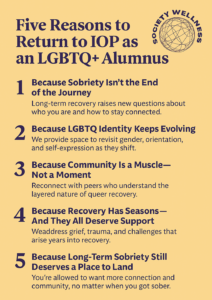Some seasons in recovery are loud—crisis-filled, urgent, all-consuming.
But others are quiet. Drifting. Going through the motions.
If you’ve been sober for a while but feel unanchored, you’re not alone. And you’re not failing. It’s common to reach a point in long-term recovery where things look stable on the outside—but inside, you feel stalled, disconnected, or unsure how to keep growing.
For LGBTQ+ alumni especially, recovery doesn’t stop when the substance use does. It evolves with identity, relationships, and what it means to feel seen—truly seen.
At Society Wellness in Boston, our LGBTQ intensive outpatient program (IOP) isn’t just for the first 90 days. It’s for wherever you are now.
Here’s why we still show up—and why we believe you still belong here, even now.
1. Because Sobriety Isn’t the End of the Journey
If early recovery is about surviving, long-term recovery is about meaning.
Once the crisis fades, you may find yourself facing bigger, more nuanced questions:
- Who am I now that I’m not using?
- What do I do with all these feelings I used to numb?
- How do I stay connected to recovery when the urgency is gone?
This is the real work of sustainable recovery—and it rarely happens in isolation.
Our LGBTQ IOP helps alumni stay tethered to what matters: community, clarity, and care. Because sobriety is a beginning—not a finish line.
2. Because LGBTQ Identity Keeps Evolving
One thing we hear often from alumni: “I thought I knew who I was. Now I’m not so sure.”
That’s not regression. That’s growth.
For many LGBTQ+ people, early sobriety clears space to revisit gender, orientation, and self-expression—sometimes for the first time with full awareness. And that clarity can be both empowering and disorienting.
You may feel:
- Ready to transition (or de-transition) and need emotional support
- Pulled toward different relationship dynamics or communities
- Triggered by old rejection wounds now that you’re more emotionally present
Our IOP isn’t just a recovery space—it’s a space where identity, queerness, and healing coexist in real-time. You don’t need to have it figured out to be welcome here. You just need to want to keep growing.
3. Because Community Is a Muscle—Not a Moment
In early recovery, it’s easy to stay connected. You have a schedule. A care team. Peers who know your story.
But over time, routines fade. Support gets quieter. Life gets busy.
If you’ve found yourself skipping meetings, ghosting old supports, or wondering, Where did my people go?—you’re not alone.
Rejoining or continuing in LGBTQ-specific IOP can:
- Rebuild routine without rigidity
- Offer structure that feels supportive, not suffocating
- Reconnect you with peers who get the layered nature of queer recovery
You don’t need to start over. You just need to reconnect.

4. Because Recovery Has Seasons—And They All Deserve Support
Some days are stable. Others aren’t. Life keeps happening, and so does recovery.
You may have:
- Experienced a breakup or loss that shook your foundation
- Returned to your hometown or workplace and felt old patterns surface
- Found that old grief or trauma is showing up with new weight
You might not be at risk of relapse—but you are feeling adrift.
Our LGBTQ IOP is designed not just for acute stabilization but for sustained wellness. That includes:
- Reprocessing grief and trauma in the context of long-term sobriety
- Supporting emotional health as your relationships shift
- Helping you rediscover purpose when the old “why” no longer resonates
Recovery isn’t static. Your care shouldn’t be either.
5. Because Long-Term Sobriety Still Deserves a Place to Land
There’s a myth that if you’ve been sober “long enough,” you shouldn’t need help anymore.
That myth hurts people.
At Society Wellness, we believe healing is nonlinear—and that support should be available at any stage. Whether you’re six months, six years, or sixteen years into recovery, you’re allowed to want more:
- More connection
- More clarity
- More community that sees you, not just your sobriety date
If what you miss most is feeling seen, held, and understood—our doors are still open.
FAQs for Alumni Considering IOP Again
Q: Is IOP just for people in early recovery?
No. Many of our alumni return to IOP after months or years of sobriety—especially when life gets heavy or connection feels distant.
Q: Will I be in group with people just starting out?
Possibly, but groups are always facilitated by trained clinicians, and our curriculum includes material relevant for all stages. Your experience adds value and perspective to the room.
Q: Do I have to be in crisis to come back?
Not at all. IOP isn’t just for emergencies. It’s for maintenance, reconnection, and reflection. Coming back is a strength—not a step backward.
Q: Can I attend part-time or for a shorter duration?
Yes. We’ll work with you to design a schedule that matches your needs. Some alumni return for a “tune-up” for 2–3 weeks. Others stay longer. There’s no one right way.
Q: What if I’m embarrassed to come back?
That’s normal. And it usually fades within the first hour. What matters is that you showed up. Everyone in our community respects that.
You Don’t Have to Re-Explain Your Story. You Just Have to Come Back.
If you’ve been feeling disconnected from your recovery—or simply miss what it felt like to be deeply understood—this is your invitation.
At Society Wellness, our LGBTQ IOP in Boston isn’t just about sobriety. It’s about belonging. Whether you’re months or years past your first intake, we still have a seat for you.
Call at (888) 964-8116 or explore our LGBTQ IOP program.

